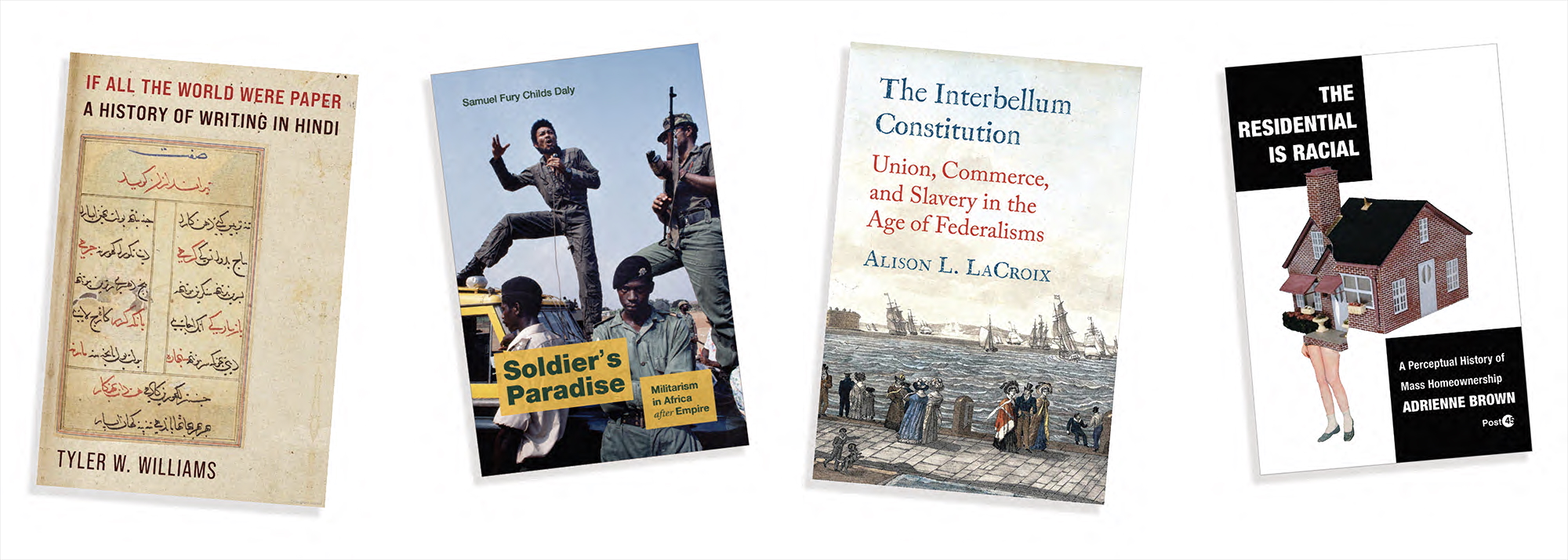
A selection of recent books by UChicago faculty members.
If All the World Were Paper: A History of Writing in Hindi
By Tyler W. Williams, Associate Professor in the Department of South Asian Languages and Civilizations
Hindi, today the fourth most widely spoken language in the world, became a language of literature in the mid-14th century. Previously South Asian literature and scholarship were written in “classical” languages like Persian or Sanskrit. Tyler W. Williams investigates the social and material processes that led Hindi to be used in works of fiction, scholarship, and religious texts, and how these writings in turn shaped the use and perception of the language. Williams gives significant attention to not only the content of the works he studies but also how people lived with them on a daily basis—how they used them, organized them, wrote in them. The approach offers a new model for studying South Asian languages and literature in their social contexts.
Soldier’s Paradise: Militarism in Africa after Empire
By Samuel Fury Childs Daly, Associate Professor in the Department of History and the College
In the mid to late 20th century, independence in former European colonies in Africa was followed, in dozens of countries, by military coups. Military dictators hoped to break definitively from European norms and to restructure society around martial ideals like order and discipline. At first many civilians believed in this vision, hoping it would lead to modernization and national strength. Samuel Fury Childs Daly focuses on the contradictory role of law in these regimes: though the law was a useful tool for military rule, judges often undermined the leaders’ goals. Daly studies how this tension operated in a number of countries—particularly in Nigeria, which was governed by military leaders for over 30 years, the longest of any of these nations. The impact of militarism in the 20th century is often overlooked, says Daly. By reckoning with its prominence following decolonization, we can better understand the recent resurgence of militarism in Africa.
The Interbellum Constitution: Union, Commerce, and Slavery in the Age of Federalisms
By Alison L. LaCroix, Robert Newton Reid Professor of Law at the Law School
The US Constitution changed dramatically between the War of 1812 and the Civil War, as the federalist vision laid out by the founding fathers was tested. A debate about the fundamental organization of the country raged among politicians, journalists, and ordinary people. Ultimately, Alison L. LaCroix argues, these debates led to the Civil War and to our modern view of the Constitution. LaCroix brings together legal, political, and social history to illuminate this period of intense constitutional debate, which has often been forgotten or oversimplified. These interbellum debates about federalism are especially relevant today, she writes, when disagreement about the balance of power between states and the federal government is at the forefront of political conversations.
The Residential Is Racial: A Perceptual History of Mass Homeownership
By Adrienne Brown, Associate Professor in the Departments of English and Race, Diaspora, and Indigeneity
The central place of homeownership in the American dream was an idea consciously formed in the early 20th century. Baked into the creation of this particular American ideal and into the development of a real estate market was an assumption that the ability to own and care for a house was an inherent racial quality, writes Adrienne Brown. Brown explores the impact of mass homeownership on how Americans thought about and valued race from 1900 to 1968, when the Fair Housing Act was passed. Analyzing the work of bureaucrats and real estate agents alongside literary and artistic depictions of homeownership, she finds that people relied on subjective perceptions to assess the ideal homeowner and the value of real estate investments. As a result, ideas about race and the residential shifted constantly throughout these decades.
